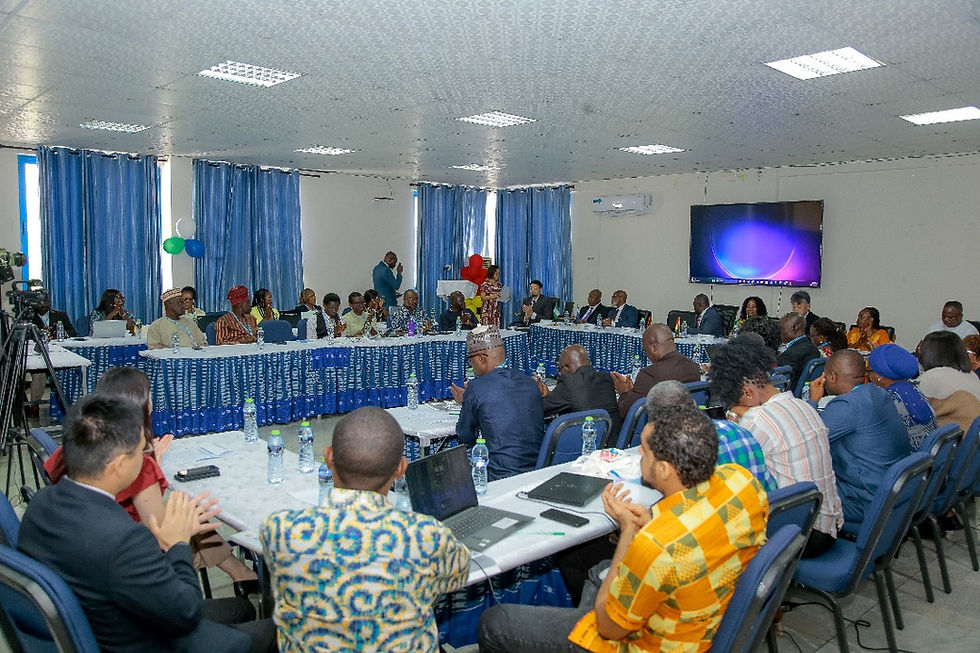Gender Ministry under financial stress -2 Social protection programmes swallow 99.5% budget
- Think News Online

- Jun 20, 2024
- 3 min read

A budget analysis of the Ministry of Gender, Children and Social Protection (MoGCSP) has shown that 99.51 per cent of its allocation goes into two social protection programmes, leaving 0.49 per cent for running the ministry.
The School Feeding Programme and the Livelihood Empowerment Against Poverty (LEAP), two social protection programmes under the ministry, swallow up GH¢2.1 billion of the ministry’s GH¢2.2 billion budget allocation from the Ministry of Finance for 2024.
This represents 99.51 per cent of funds allocated to the ministry. Although the ministry’s 2024 budget allocation was a 57.13 per cent increase over the 2023 allocation, the release amounts to less than one per cent of the national budget of GH¢226.7 billion for the year.
Dialogue
A Gender and Human Rights Advocate, Frank Wilson Bodza, made this known at a dialogue on budgetary allocations to the Domestic Violence Fund and its relevance to survivors.
The dialogue was organised by FIDA-Ghana under its Transformative Action for Gender Equality (TAGE) in collaboration with ActionAid, with funding from the European Union (EU).
Mr Bodza pointed out that from the 0.49 per cent remaining for management and administration of the ministry, its headquarters received 0.21 per cent of the budget allocation, amounting to GH¢4.5 million, gender equality and women empowerment is allocated GH¢464,659, which is 0.02 per cent of the ministry’s budget.
Child protection, promotion and development gets GH¢464,659 which is also 0.02 per cent, while the Human Trafficking Fund gets GH¢2.17 million, making up 0.10 per cent of the budget.
The Domestic Violence Fund is expected to get GH¢2.74 million, approximately 0.13 per cent of the allocation to the ministry. Mr Bodze said the budget analysis of the ministry had been ongoing for a while to inform advocacy for improved budget allocation to the ministry.
DV Fund
He said after the passage of the DV Act in 2007, it established the Domestic Violence Support Fund towards the basic material support of the victims of domestic violence.
It is also for the training of the families of victims of domestic violence, for any matter connected with the rescue, rehabilitation and integration of victims of domestic violence.
The fund is also towards the construction of reception shelters for victims of domestic violence in regions and districts, and also for training and capacity-building of persons connected with the provision of shelters, rehabilitation and integration.
He said after the first seed money of GH¢50,000 in 2008, it was not until 2021 that an allocation of GH¢1 million was made to the fund but was never released.
However, in 2022, the total allocation of GH¢2.12 million was released in full while in 2023, only 68 per cent of the allocation to the fund was released.
He recommended that the ministry prioritise the provision and maintenance of shelters preferably in all 16 regions of Ghana and expand offices to the regions and districts.
However, he said in the interim, he had called on the DV Secretariat to have a liaison officer in each region and also called for continuous advocacy to enable sustained funding to the DV Support Fund.
He called for the release of the total annual budgetary allocation to the DV Fund at the beginning of the year to enable effective planning and implementation of activities relating to domestic violence.
Tracking budgetary allocation
A Project Officer at ActionAid Ghana, Joyce Lena Danquah, in an address, said the tracking of the budget allocation had become necessary as the stakeholders wanted to ensure that the safety of women and girls was assured.
The acting Executive Director, FIDA-Ghana, Susan Aryeetey, said the mission of both ActionAid Ghana and FIDA Ghana, which were being supported by the EU, over the past two years under the TAGE project, had been to empower survivors to demand access to justice and to address the cultural norms that fuelled domestic violence.
She said statistics over the years had shown an increase in reported cases and, therefore, the need for a functioning Domestic Violence Fund that prioritised a decentralised fund that was easily accessible by survivors from all 16 regions.
The fund must also support shelters and ensure psycho-social support and other essential services such as legal aid, Ms Aryeetey added.
“We also need a fund that can support economic training initiatives and also sustain community outreach and awareness programmes to address the norms that fuel domestic violence,” the acting Executive Director of FIDA-Ghana said.
Credit: Graphic online








Comments